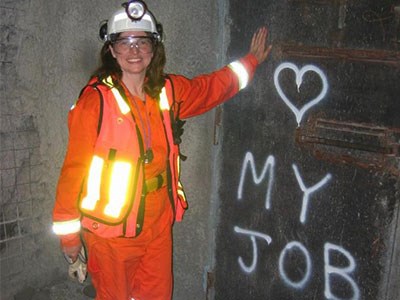The mining industry was an uninviting place for job-seeking women like Mary Louise Hill to catch a break in the 1970s.
In fact, it was a downright oddity for a female to be involved even at the grassroots level. It was deemed a newsworthy event in 1976 when Hill, as a young university student, was hired by the Saskatchewan Geological Survey for its summer program.
While she was studying geology at Carleton University, new legislation was taking aim at discrimination against women in the workplace. Up until that time, mining companies prohibited women from going underground.
But even after those laws came into force, change didn't come easy.
“It was quite blatant in those days.” said Hill, now a geology professor at Lakehead University in Thunder Bay.
When the mining companies arrived on campus for their recruiting tours, Hill eagerly signed up for job interviews. One company rep asked how many words a minute she could type.
“Me, being so foolish, I asked if we're taking typewriters into the field? They were going to hire women to sit in the office and cover up for office staff who were on vacation. It was the men in the office who were going out into the field.”
Another recruiter closed the door and announced, “We have absolutely no intention of hiring women but we're required by law to interview you. So what do you want to talk about?”
The so-called career glass ceiling appeared to be solid rock.
“Women of a certain age, we all have our horror stories to tell,” said Hill.
Her first opportunity to venture below ground came while teaching at Temple University in Philadelphia, leading a class into a former New Jersey zinc mine.
“It was my first time underground,” said Hill. “I was so excited.”
In today's industry, women occupy positions in geology, engineering, administration and supply services, but Hill finds they are still under-represented in many jobs.
“There's definitely room for more female miners.”
As a co-founder of the Thunder Bay chapter of Women in Mining, Hill is doing her part to advance the cause.
The group began its first membership drive last fall. Relying only on a few emails and word of mouth, they booked a hotel meeting room and lay out a wine and cheese spread for 40. Hill was astounded when 100 women attended.
“So many of us work as the only woman in our companies and so everybody came out out of curiosity to see who are these other women?” said Hill.
Monthly gatherings take place at a member's workplace, such as an assay lab, so all can gain an understanding of how the whole industry is interconnected.
“It crosses the disciplinary boundaries,” said Hill. “There's a lot to teach each other. We all know different aspects of the business.”
What Hill finds most rewarding is the camaraderie, the sharing of experiences, and the group's diverse makeup with field geologists, a drilling company president, lab techs, engineers, consultants, service suppliers and administrators.
“It's my favourite of all the many organizations I belong to.”
Hill said much of the talk among industry women today revolves around juggling family life with career demands that often require being away for extended periods, or the challenges of acting in a supervisory role.
“When they get out in an exploration camp in charge of siting drills and all the drillers are older men and they need them to respect their authority, that's not something
you learn in school.”
While their challenges pale in comparison to her early experiences, Hill finds it's refreshing that women are making strides and gaining respect.
“They are working, happily employed and they're being pioneers living a normal and happy family life. “They're making it work and I'm thrilled.”




